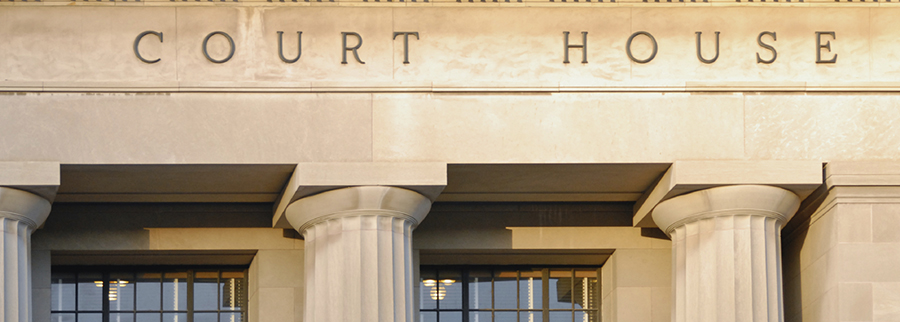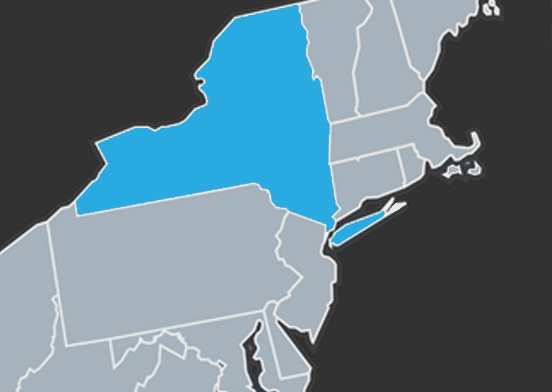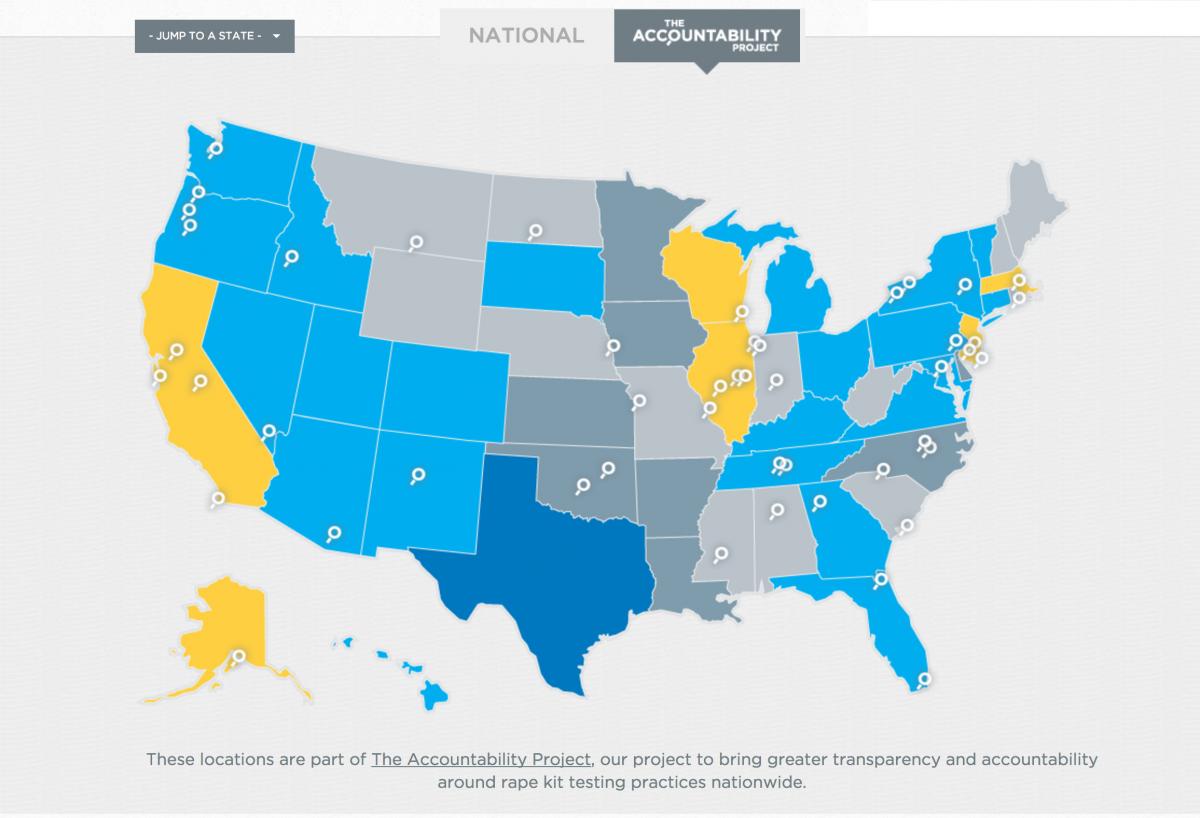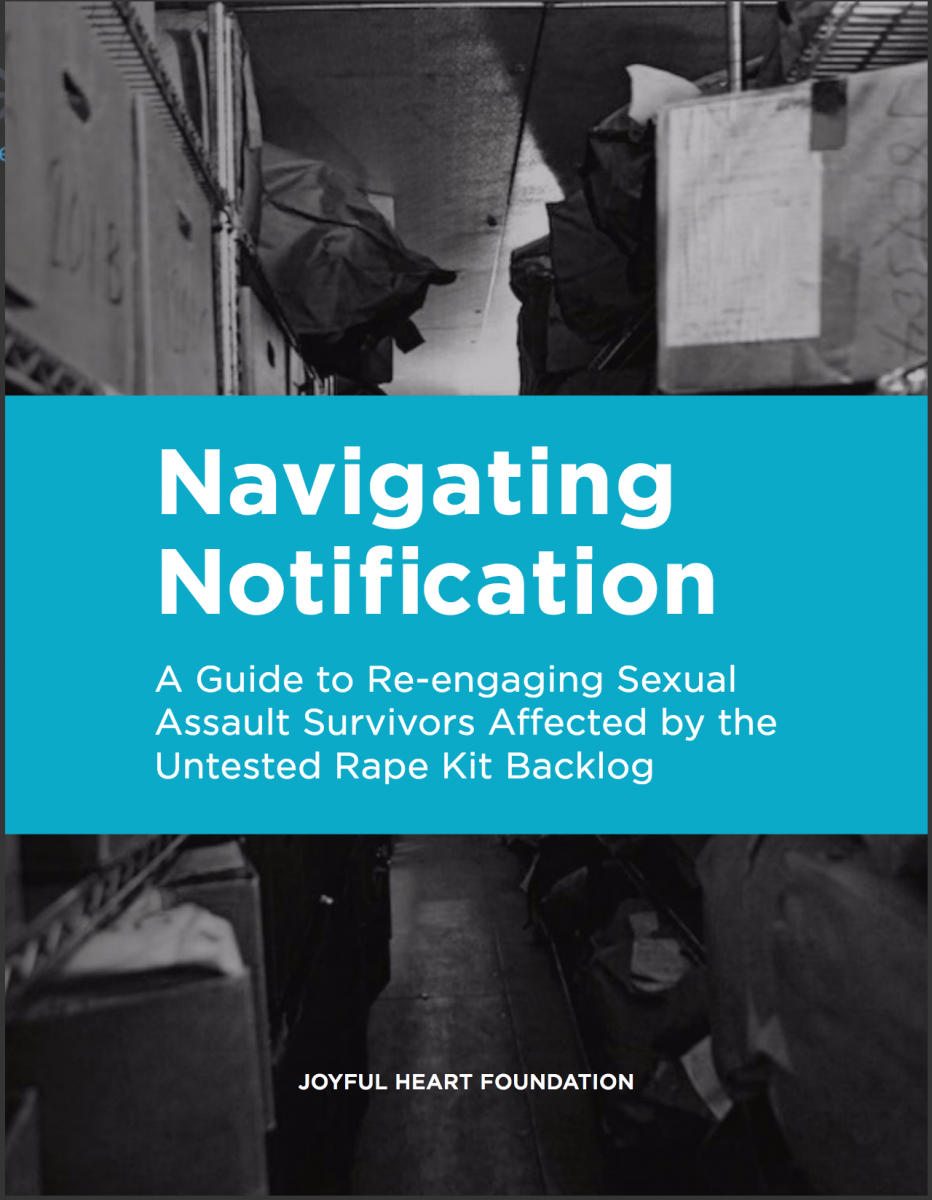You can leave this site quickly.
Learn more about Internet safety.
2016 Advocacy Accomplishments
Through our advocacy programs we seek greater access to justice for survivors. Since 2010, Joyful Heart has made the elimination of the untested rape kit backlog our top advocacy priority. We are successfully advocating for rape kit reform at the local, state, and federal levels and raising awareness about this issue across the country. In 2016, we reached 100,000 people through our website endthebacklog.org. Through our training and outreach we connected with 5,000 people about best practices for victim notification.
Federal Advocacy
State Advocacy
Training, Technical Assistance, and Conferences
The Accountability Project
“Navigation Notification” Report Release
Texas Police Foundation Grant

Federal Advocacy
Department of Justice Bureau of Justice Assistance Funding
Last year, Congress approved $41 million in funding for Sexual Assault Kit Initiative (SAKI) grants. SAKI grants provide local jurisdictions with resources to support multidisciplinary community response teams engaged in the comprehensive reform of their approaches to sexual assault cases, helping these jurisdictions test backlogged kits, investigate and prosecute cases connected to the backlog, and notify and re-engage victims within the criminal justice system. As a technical advisor to the SAKI grant program, Joyful Heart provides support to more than 40 law enforcement agencies in 20 states. In December 2016, Congress appropriated an additional $45 million funding for SAKI for FY17, which represents another victory for our advocacy efforts at the federal level and brings the total amount appropriated for SAKI to date to $131 million.
Sexual Assault Survivors’ Rights Act
 On October 7, President Barack Obama signed the Sexual Assault Survivors’ Rights Act. This new law applies to federal sexual assault cases and will serve as a model for the states to follow. The law gives survivors the right to have their rape kit preserved for the duration of the statute of limitations, to be informed of the results of rape kit testing, to be informed prior to the destruction of their kit, and to be granted the right to further preservation. Joyful Heart supported the bill, which was championed by survivor advocate Amanda Nguyen.
On October 7, President Barack Obama signed the Sexual Assault Survivors’ Rights Act. This new law applies to federal sexual assault cases and will serve as a model for the states to follow. The law gives survivors the right to have their rape kit preserved for the duration of the statute of limitations, to be informed of the results of rape kit testing, to be informed prior to the destruction of their kit, and to be granted the right to further preservation. Joyful Heart supported the bill, which was championed by survivor advocate Amanda Nguyen.
State Advocacy
In 2016, we engaged in a yearlong process to develop a multiyear strategic advocacy campaign to eliminate the rape kit backlog by 2020. Fourteen states enacted 15 rape kit reform laws in 2016.
In the fall, we released our first-ever legislative handbook for comprehensive rape kit reform, which includes a number of resources for state legislators working on legislation to address the rape kit backlog. This handbook provides legislators with useful tools for sponsoring and championing rape kit reform legislation, including talking points and a state-by-state overview of existing laws.
California
In September, California Governor Jerry Brown signed a bill requiring the California Department of Justice to establish a process for victims to request information about the location and status of their rape kits by July 2018. One of our six pillars of rape kit reform is to notify survivors about the status of their rape kit. Joyful Heart supported this bill and encouraged the governor to sign it.
New York
 Governor Andrew Cuomo signed a rape kit reform bill in December. The new law requires newly collected kits be sent to a crime lab for testing within 10 days of receipt and the lab to analyze those kits within 90 days. Law enforcement agencies are mandated to submit all rape kits currently in storage to a lab within 180 days of enactment. The lab must complete testing within 120 days of receipt and all untested rape kits in the state must be reported on every quarter.
Governor Andrew Cuomo signed a rape kit reform bill in December. The new law requires newly collected kits be sent to a crime lab for testing within 10 days of receipt and the lab to analyze those kits within 90 days. Law enforcement agencies are mandated to submit all rape kits currently in storage to a lab within 180 days of enactment. The lab must complete testing within 120 days of receipt and all untested rape kits in the state must be reported on every quarter.
Hawai‘i
Joyful Heart worked closely with the Women’s Legislative Caucus to enact meaningful reform legislation in our birthplace. We testified nine times; tweeted and reached more than 175,000 users on social media; collaborated with local advocates and survivors; and engaged the media to help secure the passage of this legislation. Signed by Governor David Ige in July, Act 207 is a victory for survivors in Hawai‘i.
Georgia
We worked with lawmakers and advocates to enact a reform bill, which had the support of all but one member of the state Senate. Our team sent alerts to our Georgia colleagues, wrote support letters, worked with media, used social media, and provided support and advice to survivor-advocates. The bill, which passed, was a big step forward for the movement.
Training, Technical Assistance, and Conferences
On June 14, Mariska joined over 5,000 advocates from across the country at the White House’s United State of Women Summit in Washington, D.C. She spoke about our work to end the rape kit backlog and improve society’s response to survivors.

In September, we presented at the first Detroit Sexual Assault Kit Summit, a three-day event attended by more than 290 prosecutors, victim advocates, police officials, and forensic and behavioral scientists from around the country.
In December, we attended the State Innovation Exchange (SiX) Legislator Conference, a gathering of more than 400 state lawmakers working on advancing progressive policies through advocacy campaigns.
Joyful Heart staff participated in the University of Arizona’s Fearless Conference on October 21. We led a discussion with nearly 30 students from across the state about the status of the rape kit backlog in Arizona and the upcoming “I AM EVIDENCE” documentary. The students contributed their thoughts and suggestions on how to engage campuses in our end the backlog campaign.
The Accountability Project
 In December 2015, Joyful Heart’s pro bono lawyers at Goodwin Procter LLP sent out Freedom of Information Act letters to 25 new Accountability Project jurisdictions across the United States.
In December 2015, Joyful Heart’s pro bono lawyers at Goodwin Procter LLP sent out Freedom of Information Act letters to 25 new Accountability Project jurisdictions across the United States.
Since then, we have received initial responses from 23 cities—19 of which have given us numbers. With these kits included, we have uncovered more than 32,000 untested rape kits since the launch of The Accountability Project.
“Navigating Notification” Report Release
In April, we released “Navigating Notification: A Guide to Re-Engaging Sexual Assault Survivors Affected by the Untested Rape Kit Backlog.” Joyful Heart partnered with Dr. Courtney Ahrens of California State University, Long Beach, to bring together the voices of more than 90 survivors and criminal justice, medical, academic, clinical, and advocacy professionals to establish a set of best practices recommendations for notifying victims whose kits are part of a backlog and re-engaging them in the criminal justice system.
Funded by the Manhattan District Attorney’s Office, “Navigating Notification”—the culmination of more than three years of original research on this issue—is a guide to conducting notification compassionately, effectively, and in a way that empowers survivors and respects their privacy and experiences.
Since its publication we reached an audience of nearly 300 people with two webinars about our research findings and implementing survivor-centric practices. Our Policy & Advocacy team hosted a briefing on Capitol Hill on June 15 for more than 50 congressional staffers, advocates, and donors. The group learned about the trends being seen across the country, reform efforts in specific cities, and the impact SAKI grants are making in addressing backlogs across the country.
Texas Police Foundation Grant
We worked with the Police Foundation and the National Center for Victims of Crime on a grant project examining the mandatory rape kit testing law in Texas (SB-1636) and another law (SB-1191) intended to increase access to forensic exams. The project’s objective is to determine whether the new laws are increasing the rates of reporting, and whether the rates of arrests, prosecutions, and convictions have increased. The Police Foundation is assessing the effect of the laws in four jurisdictions: Fort Worth, Austin, Dallas, and Arlington. The reports for the Police Foundation Grant project were finalized on January 31, 2017, providing us with informative and concerning results, most notably:
- 92% of law enforcement agencies in Texas have not complied with SB-1636, which mandates the counting and testing of all backlogged kits.
- Only 157 out of more than 1,300 law enforcement agencies have submitted any backlogged kits for testing.
- As of November 2016, these 157 agencies have submitted 19,064 backlogged kits to the lab.




